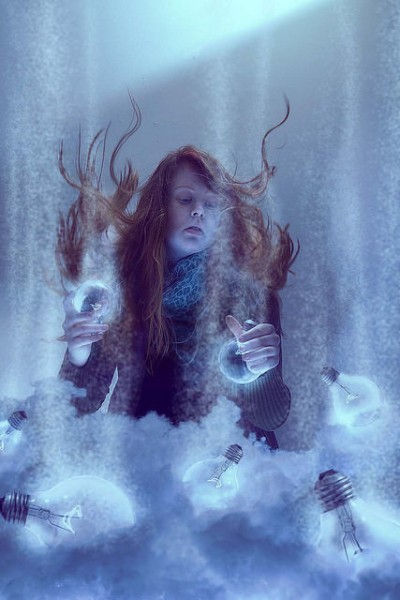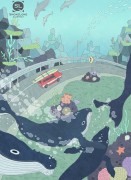The baby was asleep. The news report was over and the channel had moved on to commercials, which surprised the mother, who had stood up at the end of the newscast to do something, but what? She pressed her hands against her eyes: wet. She’d been crying. Her eyes were puffy, her stomach hollow-feeling, as it always was after a cry, but she couldn’t remember why she had been so upset. She went to the kitchen and stood by the counter. Maybe she’d make a sandwich or get a glass of water. She looked over to the father, who was still seated on the couch, watching the commercial about a new car from which a beautiful young woman emerged, then a beautiful child. He stared as the family assembled in front of the camera. His blankness worried the mother, though she did not exactly know why.
Something important had happened. Something had been said that had made her stand up, made her want to spring to action, to protect them. She put her hand on the knife on the counter and then took it away. The knife was not what she had wanted. The knife wouldn’t help what was coming. Some part of her knew that and another part couldn’t hold the thoughts together.
The baby, she thought. I should get the baby. But the baby was asleep and the baby needed to sleep. She struggled to remember: what had been so important?
The father stood up from the couch. We have to do something, he said aloud, looking at her, his eyes now alert and seeing.
What happened? She asked him.
Gas, he said. Poison.
Yes, she thought. Gas. That was it. She remembered the silver-haired man on the news, the report that had interrupted the series about young people who loved each other but simply could not make it work. They had all been in a park, eating hot dogs, when a special report interrupted the young man’s speech about how he had figured out what he really wanted from life.
Poison, she repeated. Visitors. Attack. He’d used those words, the man on the television. He had been visibly sweating. At the end of the report, he had put a mask over his face, a mask to breathe through.
The baby, he said aloud, and she had the same thought, only she was on the floor then, on her hands and knees, and she could not remember the way down. She had fallen gently and was grateful that nothing had broken.
Yes, the gas, she thought. This was probably the gas taking effect.
The baby. She crawled to the living room. She did not feel upset in that moment, but curious about her hands, which reached out and then came back to her as her knees moved her forward. The father was on the floor, too, on his back, looking up at the ceiling.
We have to do something, he said, but did not move.
It’s hard to remember what, she said.
The gas, he said.
The word was enough. She tugged at his belt and he rolled over, slowly. They both made their way to the baby’s room on hands and knees.
The baby was awake, on his back, staring up to the ceiling, where they had placed bright stars for him to look at at night before he slept. When they entered, letting in some light, the baby turned to them and let out a small sound.
OK, she said. He’s OK.
She struggled up against the crib and lifted him out. The movement exhausted her. She held him tightly against her chest and leaned back against the crib. The man crawled in next to them. He put his hand on the child’s head.
Gotta get away, he said, but the words were slow and they both knew they were not true. There was nothing they had to do anymore.
No, she said. We stay. Stay and hold the baby. When she said it, she felt a relief. Nothing held together anymore, and she was so, so tired. The gas, she thought again, but the thought meant nothing. Gas, a thing hissing from a stove. Gas, a thing that’s not solid or liquid. What was there left that was real? Solid and liquid? The baby. The baby was here and she was here and the father was here and that was all.
No, she said again. We just hold the baby.
He moved closer and they linked and combined and collapsed against each other. He did not speak because he could no longer respond, she could feel that draining from him as it was from her. But she had something left. It came to here whole and bright: the baby’s song, the one they always sang him.
Outside of herself, outside their arms, she heard a great sound. A screeching. Something being torn away from the ground and thrown a great distance. The slice of light in the hallway died. Another sound, this time above them, and their hair moved in the wind. The night was suddenly everywhere, the cold touching their faces, but all of that was faraway. The sound continued but it did not matter.
The only thing left was the song and so she sang it. He hummed along, having lost words. The baby, knowing the song—it was an old one, the first song—smiled up at them, opened and closed his eyes, and brought his fingers to his mouth. The song was the last thing they heard before the source of the sound arrived and brought its final silence.

Notes from Guest Reader Ryan Ireland
I love the way the author disorients the reader in this story, the way the characters blip in and out of consciousness and the tension grows as the reality surrounding them grows. The actions in here are simple ones—standing up, walking down a hall, singing a song—but they become more powerful as the story builds.


 The core workshop of SmokeLong Fitness is all in writing, so you can take part from anywhere at anytime. We are excited about creating a supportive, consistent and structured environment for flash writers to work on their craft in a community. We are thrilled and proud to say that our workshop participants have won, placed, or been listed in every major flash competition. Community works.
The core workshop of SmokeLong Fitness is all in writing, so you can take part from anywhere at anytime. We are excited about creating a supportive, consistent and structured environment for flash writers to work on their craft in a community. We are thrilled and proud to say that our workshop participants have won, placed, or been listed in every major flash competition. Community works.